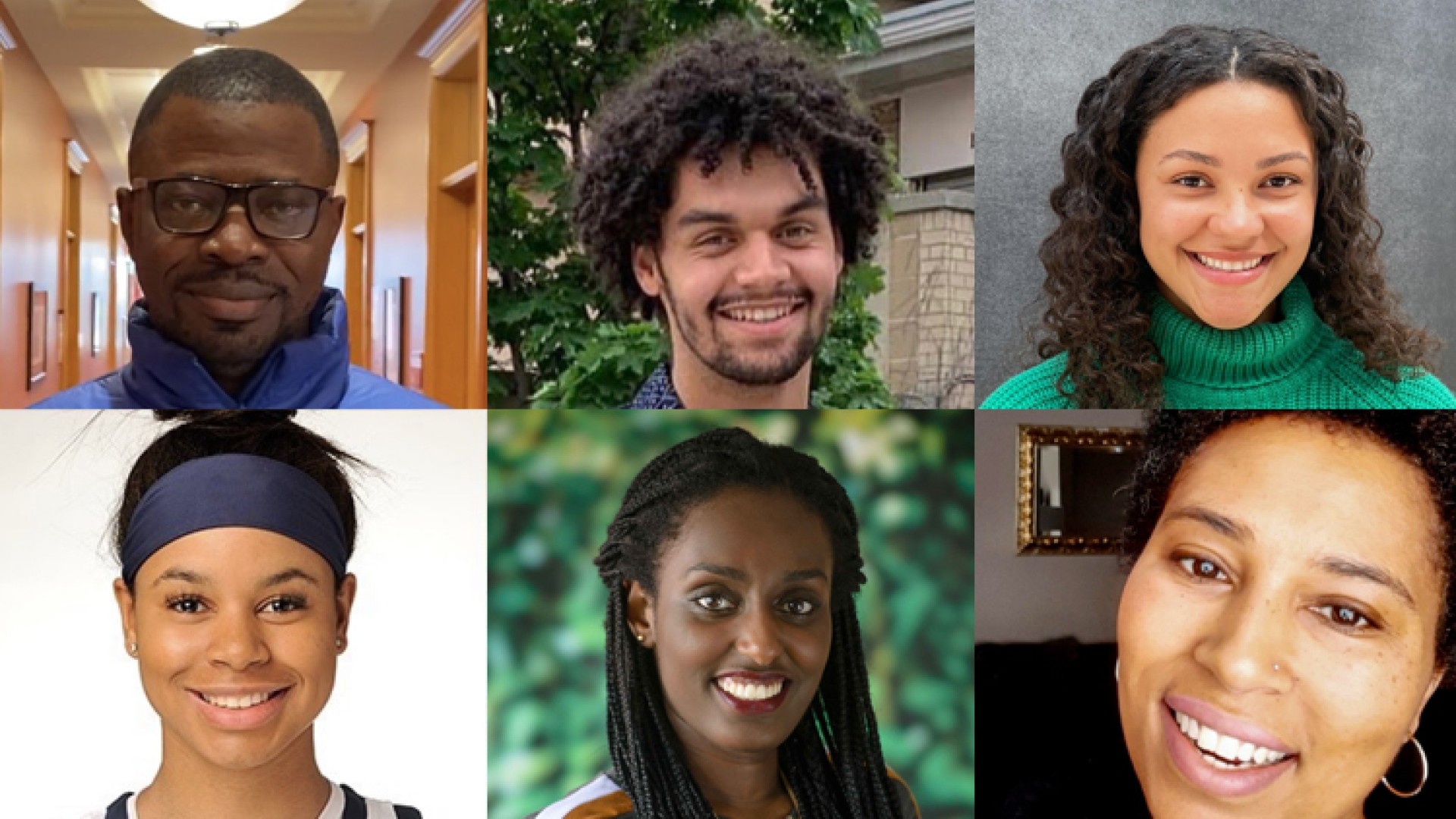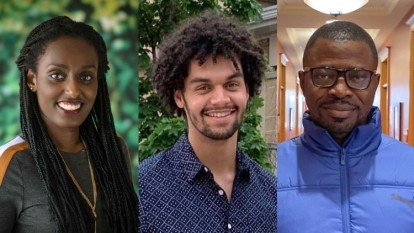
Six StFX students will be adding their voices to wider discussions around systemic and institutional racism and enabling change as the inaugural recipients of StFX’s Frank McKenna Centre’s Racial Justice Leadership Grants.
The annual grants, of $4,500 each, are designed to provide Black and Indigenous students with funding and institutional resources to support projects that include research, organizing and outreach work, or advocacy and activism in racial justice.
The intent is to contribute to wider efforts in the community and at StFX to take needed, decisive action to combat racism and the systemic exclusion and disenfranchisement of Black and Indigenous students in Canadian society and in higher education.
Inaugural grant recipients include Devon Parris, Tara Reddick, Boye Matuluko, Rebecca Mesay, Aliyah Fraser and Claire Joseph. They will work on projects that range from uncovering the barriers that Black mothers and children face to developing a more critical audience for anti-racism films and discourse.


PLATFORM TO BE HEARD
“I’m most excited about the opportunity to add my voice to the wider discussions about systemic and institutional racism that have reignited over the summer,” says Devon Parris, a fourth year honours English major and former varsity athlete from Kingston ON, whose project will focus on “The Anti-Racist Film Review: Separating the Performative from the Informative.”
“By the end of my project, I hope to create a more educated viewership among anti-racist film consumers. Film is one of the most influential mediums for dispersing ideas of racism and anti-racism, and the superficiality of films like Green Book and The Help can generate a misunderstanding of racism as a complex social, financial, and ideological challenge. Through explaining the issues of such films, while highlighting other works that offer more substantial critiques—like Sorry to Bother You or Blindspotting—I want to help develop a more critical audience for both anti-racist film and anti-racist discourse,” he says
“By providing Black and Indigenous students with this platform, I feel like these grants will have a profound impact in uplifting BIPOC voices throughout the StFX campus. All of this year’s recipients have fantastic projects that identify and explain various issues that BIPOC students/communities face, which can help create a more socially aware Xavierian community while allowing Black and Indigenous students a platform to be heard.”
KEEP THE CONVERSATION GOING
Tara Reddick of Antigonish, NS, a fourth year sociology honours student and proud mother to four children, one of whom also attends StFX, says this opportunity excites her because it provides a way to keep the conversation surrounding racial justice alive.
“More than ever, we need to put in motion tangible ways to help fight racial injustices and inequalities,” says Ms. Reddick whose work is entitled, “Black Motherhood: The Activism of African Nova Scotian Women.”
“As soon as I learned about this opportunity, I was interested. It also helps that I was encouraged by two of my awesome professors, Dr. Norine Verberg and Dr. Katie Aubrecht of the Sociology Department. This opportunity fits nicely with my area of study and my community involvement as well as my genuine desire for change,” she says.
“Through this grant, I can uncover the barriers that Black mothers and children face. My project will provide a platform so that Black women can come together in conversations surrounding social justice.”
Ms. Reddick says these grants will not only transform racial justice strategies at StFX, but they have the potential to impact all universities in Canada as it encourages students of colour to be part of the anti-racism and racial justice strategy.
“There is no denying systemic racism and there is no denying that there are various ways to dismantle it. These grants are providing ways to do that,” she says.
NEW FRONTIERS
“Opportunities connect people to new frontiers, and it opens the door to a new challenge. My excitement about the Frank McKenna Centre for Leadership Grant is that it is activating the possibility of connecting with people of color with a common but different shared story,” says Boye Matuluko, a fourth year development major honours student from Nigeria, who is also taking a minor in sociology.
Mr. Matuluko will host a podcast segment that will air during Social Justice Radio, where Black and minority student voices, critiques, and suggestions will be featured. Social Justice Radio is a weekly news magazine show on CFXU (93.3 FM) and is also available as a podcast (http://socialjusticeradio.onelouder.ca/). This segment will also be available and be disseminated on social media.
“I am interested in this project,” he says, “because it will activate Black and minority students’ human capacities through participation, identification, internalization, and finally dissemination. Heron (2005) suggests that student participation in social justice and activism relationships may inevitably work to shape their identities,” he says.
“The project’s activities will assist Black and minority students to increase their participation in community-based organizations and therefore advocate for equitable opportunities. These project activities will validate the disrupting and subverting arrangements that promote marginalization.”
He says the grant will help people of color develop and sharpen research capabilities and open windows of collaborations and opportunities within and outside the university environment. “I envisage more students will become more engaged in social discourse.”
LOOK AT NEEDS
Aliyah Fraser, a second year health science student and member of the X-Women basketball team, will collect data for Black and Indigenous athletes and their struggles for her project, “Black and Indigenous athletes association.” “We’re going to figure out needs of athletes, challenges they face, and what supports we need, basically forming a council made up of students where they can get support and resources that affect them.”
Ms. Fraser says she is excited about the opportunity to connect with minority students at StFX and to make a positive difference in their lives. “I was interested in participating as my coach recommended it was a good fit for me and with everything going on in the world today, I believe I can help Black and Indigenous students. I think these grants will have a huge impact as they are helping a vulnerable population and will spread awareness.”
In her project, Rebecca Mesay will focus on “But Why Can’t I Say the N-Word?”: Understanding the Experiences of Black Students at StFX University. Ms. Mesay is a recent StFX graduate with a degree in political science and development studies and a focus in international politics. She recently returned to StFX to pursue additional research opportunities. She served as StFX Students’ Union President for 2018-2019 and has worked previously with the Antigonish Women’s Resource Centre and the Maple League of Universities. She says the most exciting part about this opportunity is that Black students at StFX are getting a concrete and significant platform upon which to centre their voices and work in the school community. “When I read about the grant, I immediately thought that it was meant for someone like me. I knew that I could undertake a project that put a spotlight on the experiences of Black students at StFX. I hope that my project contributes to making StFX a better place for Black students to be who they are, without any repercussions.”
She says the creation of these grants mimicked a larger shift in thinking about Black people and their treatment by our institutions. “I think this is just the beginning in a lot of ways. The impact of these grants is to begin the work of identifying the barriers that face Black students at StFX and doing the work to address those issues.”
SIGNIFICANT, LASTING IMPACT
Claire Joseph, a fourth year student in the StFX Rankin School of Nursing, who has spent her time at StFX studying health policy, social determinants of health and health research, will undertaken a project, "Barriers and Facilitators to Accessing Sexualized Violence Prevention and Response Services for Racialized Students on a University Campus in Canada." She says the most exciting part about this opportunity for her is the ability to really get her work out there.
“I am so excited to have access to mentors from the McKenna Centre and look forward to the guidance, support, and connections this opportunity provides for us. I was interested in participating because I saw this grant in alignment with my values. Social justice, equity, and leadership are very central to my personal goals as well as the goals of this grant program. I hope that my research will highlight actionable areas where sexualized violence services can become more accessible for racialized students.”
For her project, she hopes the grant will have a significant and lasting impact by creating more equitable learning conditions for racialized students.
“Overall, I think these grants will allow Black and Indigenous students to feel represented in research and also allow us to benefit from the projects as they are designed to better support our education. These grants will also have a huge impact on the students who receive them, providing confidence, mentorship and also leadership experience to help us reach new heights in our own academic careers and beyond.”

